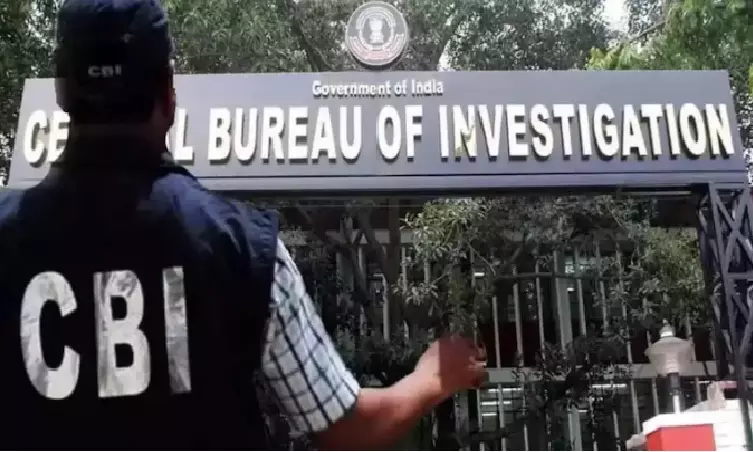The Central Bureau of Investigation (CBI) has intensified its probe into the alleged irregularities in the Valmiki Corporation by conducting raids across multiple locations in Karnataka and Andhra Pradesh. Early morning operations targeted residences and offices of officials linked to the case, with the CBI reportedly seizing crucial documents and electronic records. The Valmiki Corporation, which was created to uplift Scheduled Tribes through welfare schemes, has been under the scanner after allegations of widespread misappropriation of funds. Sources suggest that the raids were coordinated simultaneously to prevent the destruction of evidence.
Officials confirmed that the raids were conducted in Bengaluru, Ballari, and several towns in Andhra Pradesh where contractors and middlemen associated with the corporation operate. Preliminary findings indicate that large sums of money meant for tribal welfare schemes were siphoned off through inflated contracts, ghost beneficiaries, and manipulated records. The CBI has already identified key individuals suspected of playing a central role in diverting funds. This operation is part of a larger effort to uncover the depth of corruption within the Valmiki Corporation, which has long faced allegations of inefficiency and favoritism in its functioning.
The raids have created ripples in political circles as the corporation functions under the State government but receives significant central funding. Opposition leaders in Karnataka have demanded accountability from the ruling government, accusing it of allowing systemic corruption to flourish unchecked. The revelations are expected to trigger a political storm in both Karnataka and Andhra Pradesh, as the misuse of funds meant for vulnerable communities could lead to a major public outcry.

The CBI has intensified its probe into the Valmiki Corporation scandal, expanding raids to several offices and residences of senior officials linked to the corporation. Sources confirmed that documents detailing fund allocations, contractor agreements, and project progress reports have been confiscated. Investigators are now mapping financial flows to identify diversion of funds and collusion networks. Early indications suggest that fraudulent practices may have spanned multiple years, pointing to a deeply entrenched system of corruption. This escalation has created an atmosphere of unease among bureaucrats and contractors who previously worked with the corporation.
Public anger over the scandal is also rising, with tribal communities staging protests in parts of Karnataka demanding accountability and immediate corrective measures. Demonstrators have accused the state of neglecting their welfare while allowing public money to be looted by vested interests. Civil society groups have called for the formation of independent vigilance committees to monitor welfare schemes at the grassroots level. They argue that without transparency and community participation, funds meant for marginalized communities will continue to be misused. The protests highlight the growing mistrust between vulnerable groups and the state apparatus.
Political leaders have adopted combative positions, with opposition parties demanding the resignation of ministers responsible for tribal welfare. They allege that corruption could not have thrived without political patronage, insisting on a legislative review of all welfare corporation finances. The ruling government has countered these claims, accusing the opposition of exploiting the issue for electoral gain. Ministers have reiterated their commitment to cooperate fully with the CBI, but critics remain unconvinced. The controversy has quickly escalated into a political flashpoint, with both camps preparing to weaponize the scandal in upcoming elections.
In financial and administrative circles, the scandal is sparking discussions about the vulnerability of welfare corporations to misuse. Experts point out that many of these bodies function with limited oversight, creating gaps that corrupt officials exploit. They suggest mandatory annual audits by independent agencies and the introduction of real-time fund-tracking systems to ensure accountability. Calls for reform are growing louder, with analysts warning that unless structural changes are implemented, the Valmiki Corporation case may only be the tip of the iceberg. The CBI’s findings in the coming months will likely set the tone for such reforms.
Welfare Schemes Under a Cloud
The Valmiki Corporation was established with the primary goal of uplifting Scheduled Tribe communities through financial assistance, housing schemes, educational support, and livelihood programs. However, insiders allege that only a fraction of the funds reached genuine beneficiaries. Instead, officials and contractors are suspected of colluding to siphon money through fraudulent documentation. The CBI’s action comes after months of mounting complaints from activists who argued that despite heavy funding, the impact of the corporation’s schemes on tribal communities remained negligible.
This scandal has highlighted how welfare schemes often become vulnerable to exploitation by corrupt networks. In Karnataka, several tribal welfare projects under the Valmiki Corporation were already under scrutiny for failing to deliver promised outcomes. The raids, therefore, are seen as a step toward holding officials accountable and ensuring that resources meant for marginalized groups are not stolen by vested interests. Civil society groups have welcomed the investigation, urging the CBI to carry out a thorough probe without political interference.
The CBI’s ongoing raids linked to the Valmiki Corporation case have entered a decisive phase, with more evidence surfacing about systemic corruption. Officials reported that several influential contractors and middlemen are under close scrutiny for allegedly channeling welfare funds into personal accounts. Large volumes of financial records and digital devices were seized, which investigators believe will shed light on the trail of illegal transactions. This operation, spanning multiple states, is considered one of the most significant crackdowns on alleged misuse of tribal welfare funds in recent years, setting the stage for a prolonged legal battle.
According to preliminary findings, misappropriation may have occurred in housing projects, micro-loan disbursements, and educational scholarships. Whistleblowers had earlier claimed that ghost beneficiaries were created to divert funds while genuine applicants faced bureaucratic hurdles. The raids, therefore, have reignited debates on the transparency of welfare delivery systems. Investigators are now analyzing the data collected to build a stronger case for prosecution. Insiders suggest that this could lead to arrests of key officials and contractors who may have colluded in siphoning off crores of rupees intended for tribal welfare.
Political parties in Karnataka have quickly seized the opportunity to mount attacks on each other. The opposition has demanded an independent audit of all welfare corporations functioning under the state, alleging a pattern of corruption. Ruling party leaders, however, have distanced themselves from the scandal, insisting that the CBI probe will unearth the truth regardless of political affiliations. This war of words has intensified ahead of upcoming elections, with both camps hoping to use the issue to sway voters, especially in constituencies with significant Scheduled Tribe populations.
Meanwhile, activists and civil society groups have raised concerns over the human cost of corruption. They argue that when welfare funds are misused, the poorest sections of society bear the brunt of neglect. Many tribal families remain deprived of housing, education, and employment support despite allocations worth hundreds of crores. The raids have revived demands for a transparent monitoring mechanism that involves local communities in overseeing welfare schemes. Without such accountability, they warn, corruption could continue unchecked under different guises.
The scandal has also raised questions about inter-state coordination of welfare programs. With CBI teams operating in both Karnataka and Andhra Pradesh, the possibility of a larger, interstate nexus is being explored. Some contracts were reportedly awarded to firms with operations in both states, raising suspicions about cross-border financial manipulation. If such a network is confirmed, the case could expand beyond the two states, attracting attention from central agencies tasked with financial monitoring and fraud prevention.

Political Fallout and Public Response
The CBI raids are likely to have far-reaching political consequences in Karnataka and Andhra Pradesh. In Karnataka, the opposition has accused the government of failing to monitor welfare corporations effectively, calling it a betrayal of the trust placed by Scheduled Tribes in the state’s leadership. In Andhra Pradesh, too, political leaders are bracing for questions on how funds routed through joint projects and inter-state contracts were allegedly misused. Public anger is expected to intensify as details of the case emerge, particularly among tribal communities who feel cheated by the very schemes meant for their empowerment.
In administrative circles, the scandal has triggered unease among officials working in other corporations. Many are now worried that their own departments may come under similar scrutiny, given that welfare corporations handle vast sums of public money. Some insiders suggest that irregularities are not unique to the Valmiki Corporation but are widespread in welfare boards across states. The CBI action, therefore, could set a precedent for more rigorous audits and enforcement measures nationwide, fundamentally altering the way welfare schemes are managed.
The raids have also brought into focus the role of technology in preventing corruption. Experts argue that better digital tracking of funds and biometric verification of beneficiaries could have minimized the chances of fraud. In recent years, Aadhaar-linked schemes have improved transparency, but critics claim loopholes remain that are easily exploited by insiders. With the spotlight on the Valmiki Corporation, there is renewed pressure on governments to upgrade monitoring systems to ensure that welfare funds actually reach the intended recipients without leakage.
In tribal communities themselves, reactions to the scandal have been mixed. While there is anger at being cheated out of promised benefits, there is also a cautious hope that the CBI action will finally bring justice. Community leaders have urged the government not only to punish the guilty but also to rebuild trust by strengthening welfare delivery systems. They emphasize that tribal populations, often residing in remote areas, are especially vulnerable to exploitation and need stronger safeguards. The unfolding investigation, therefore, carries significant social implications beyond its immediate legal and political impact.
Legal experts caution that while the raids are a strong first step, the road to justice may be long and complex. Proving financial fraud of this magnitude requires meticulous analysis of records, corroborative witness statements, and airtight legal strategy. Past corruption cases have often collapsed due to weak evidence or procedural lapses. The CBI will thus be under immense pressure to ensure that its case is comprehensive and withstands judicial scrutiny. Success in this case could set a benchmark for future investigations into welfare-related corruption.

The broader lesson emerging from the Valmiki Corporation case is the urgent need for structural reforms in how welfare boards operate. Analysts argue that political interference, lack of transparency, and weak accountability mechanisms create fertile ground for corruption. Unless these issues are addressed, similar scandals are bound to recur. The raids may serve as a wake-up call for governments across India to prioritize integrity and efficiency in welfare governance, ensuring that funds meant for marginalized groups are not siphoned away by vested interests.
Follow: Karnataka Government
Also read: Home | Channel 6 Network – Latest News, Breaking Updates: Politics, Business, Tech & More

